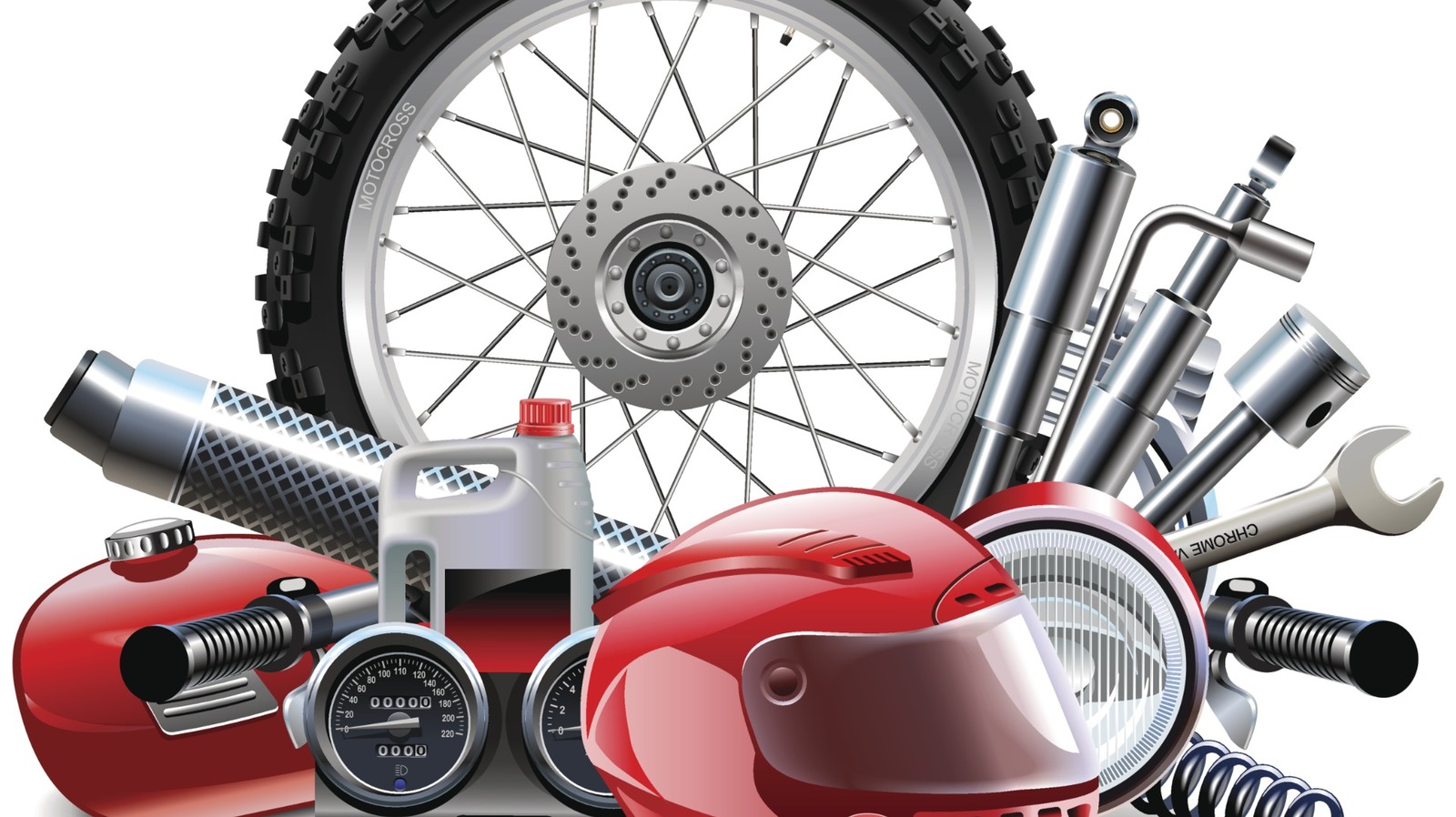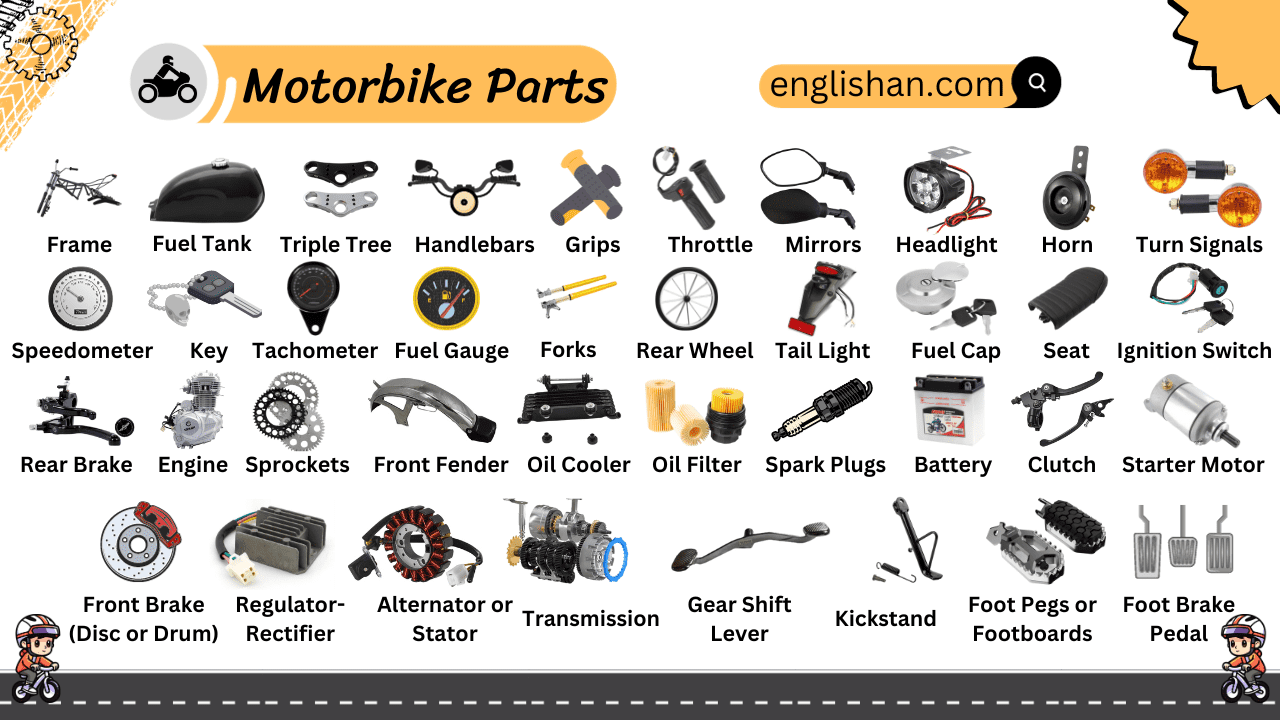Beginner’s Guide to Assembling Basic Motorbike Components NZ
Beginner’s Guide to Assembling Basic Motorbike Components NZ
Blog Article
Discover the Crucial Motorcycle Parts You Required for Ideal Performance
Understanding the crucial parts of a motorbike is fundamental for attaining peak performance. Each element, from the engine to the braking system, plays a vital role in overall capability and security. Regular upkeep can stop unforeseen failings and boost the riding experience. Lots of bikers neglect the complexities of these systems. Discovering just how they work with each other can result in an extra efficient ride. What essential elements should every biker prioritize?
The Engine: The Heart of Your Bike
The engine functions as the core element of a motorbike, driving its efficiency and specifying its capacities. It is in charge of transforming gas right into power, which powers the bike forward. Different types of engines are employed, including single-cylinder, V-twin, and inline configurations, each offering distinct features suited for various riding styles and objectives. The engine size, generally measured in cubic centimeters (cc), substantially influences performance, with bigger engines generally supplying more power and torque.Furthermore, the engine's layout and technology, such as fuel shot systems or air-cooling versus liquid-cooling, influence performance and integrity. Upkeep is crucial for peak operation; variables like routine oil changes and checking spark plugs warranty durability. Riders commonly take into consideration an engine's responsiveness and smoothness, as these qualities improve the general riding experience. Eventually, the engine continues to be a vital element that defines not only the motorbike's performance but also the cyclist's link to the equipment.
The Transmission: Shifting Gears Efficiently
The transmission plays an essential function in a motorbike's performance, specifically in the technicians of equipment changing. Recognizing just how to change equipments smoothly can boost the overall riding experience, while routine maintenance assurances peak capability. Proper focus to these facets can considerably influence the durability and performance of the bike.

Gear Shifting Mechanics
Smooth equipment moving is vital for optimal motorcycle performance, greatly influencing both acceleration and control. The mechanics of gear changing include the communication between the clutch, equipment lever, and transmission system. When a rider involves the clutch, it disengages the engine from the transmission, permitting an equipment change without harming the parts. A well-timed launch of the clutch, incorporated with specific movement of the equipment lever, facilitates a smooth modification in between gears. This process ensures that the engine operates within its ideal power band, improving performance. Motorbike Components NZ. Furthermore, understanding the gear ratios and their effect on rate and torque can help motorcyclists make notified options during shifts, eventually adding to a more pleasurable and responsive riding experience
Maintenance Tips Relevance
Regular upkeep plays a necessary role in assuring that the transmission system operates effectively, permitting smooth equipment changes. On a regular basis changing the transmission and checking liquid is crucial, as old liquid can cause boosted friction and wear. In addition, evaluating the clutch for wear warranties peak involvement and disengagement, protecting against slippage throughout gear modifications. Lubrication of moving parts is similarly crucial to lower rubbing and enhance efficiency. Motorcycle proprietors must also check for leaks and unusual sounds, as these can show underlying problems. By sticking to these maintenance ideas, bikers can lengthen the life-span of their transmission system, assuring that equipment shifts remain smooth and adding to the total efficiency of their motorcycle.
The Braking System: Ensuring Safety And Security on Every Experience
Braking systems are basic elements that directly affect a motorcycle's security and performance. They contain numerous parts, including brake pads, rotors, calipers, and hydraulic lines, all interacting to guarantee reliable slowdown. The sort of stopping system-- usually either disc or drum-- affects responsiveness and stopping power.Regular upkeep is important to support peak efficiency; used brake pads can bring about reduced effectiveness and boosted quiting ranges. In addition, the quality of brake fluid must be kept track of, as it can absorb wetness with time, compromising stopping efficiency.Riders ought to also think about the importance of anti-lock stopping systems (ABS), which protect against wheel lockup throughout abrupt stops, enhancing overall security. Properly functioning brakes are not almost quiting; they impart self-confidence in the rider, enabling much safer navigating via different terrains. Inevitably, a reliable stopping system is critical for enjoying every trip with assurance.
The Suspension: Enhancing Comfort and Control
A well-functioning suspension system significantly adds to a motorbike's general performance, matching the effectiveness of the braking system. The suspension plays a significant duty in taking in shocks from uneven surface areas, assuring a smoother experience while keeping tire contact with the roadway. This get in touch with is crucial for both stability and control, enabling cyclists to navigate corners with confidence and precision.Different sorts of shock absorber, such as telescopic forks or mono-shocks, use differing degrees of convenience and handling. Appropriately tuned suspension boosts responsiveness, supplying the rider with a more linked feeling to the motorcycle. Routine upkeep checks are necessary to determine the suspension components, including dampers and springtimes, are operating at their finest. An effective shock absorber not only elevates the riding experience however also contributes to the longevity of other motorcycle components by lessening deterioration. As a result, buying high quality suspension is vital for any significant motorcycle lover.
The Tires: Attaching You to the Roadway
Tires play a necessary role in a motorbike's performance, serving as the main web link in between the rider and the road. Recognizing the various kinds of tires offered can considerably impact taking care of and safety and security. Additionally, regular upkeep is crucial to ensure peak tire performance and long life.
Tire Types Explained
Just how do various tire kinds influence a motorbike's efficiency? Tire types play a vital role in figuring out a motorcycle's stability, handling, and grip. Sport tires, created for high performance, deal improved grip and responsiveness on paved roadways, making them optimal for racing and hostile riding. Alternatively, exploring tires prioritize durability and convenience, supplying a smoother experience for long-distance traveling. Off-road tires, defined by their sturdy walk patterns, stand out in traction on unpaved surfaces, ideal for journey lovers. In addition, dual-sport tires mix attributes from both on-road and off-road categories, dealing with flexible riding requirements. Ultimately, choosing the ideal tire kind is essential for optimizing performance, ensuring security, and enhancing the general riding experience.
Maintenance Tips Offered
While riding when driving, maintaining suitable tire problem is crucial for safety and security and performance. Frequently checking tire stress is essential, as under-inflated tires can cause bad handling and increased wear. It is a good idea to examine step deepness regularly; used tires concession hold and stability. Furthermore, motorcyclists need to try to find signs of damage, such as cracks or bulges, which can show the requirement for substitute. Rotating tires occasionally assures even use, improving durability. Furthermore, maintaining tires clean from debris and staying clear of too much aesthetics can prolong their life expectancy. Ultimately, maintaining proper positioning and equilibrium adds to peak efficiency, reducing stress on other bike parts. Following these maintenance suggestions will substantially improve the general riding experience.
The Fuel System: Sustaining Performance and Effectiveness
The fuel system plays an essential role in making the most of a motorbike's efficiency and efficiency, as it guarantees the ideal delivery of gas to the engine. It consists of numerous important parts, including the fuel tank, fuel pump, fuel filter, and gas injectors or carburetor. Each component has to work properly to guarantee a powerful and smooth ride.The gas container shops gasoline and provides it to the engine by means of the gas pump, which produces the necessary stress. A gas filter avoids pollutants from getting in the engine, while the injectors or carburetor mix gas with air for combustion.Proper maintenance of the fuel system is crucial; a blocked filter or malfunctioning injector can bring about reduced performance and raised gas usage. By validating that the gas system runs efficiently, bikers can enjoy enhanced throttle about his reaction, far better gas economic climate, and on the whole enhanced riding experience.
The Electrical System: Powering Your Trip
An effective electric system is crucial for the total capability and safety of a motorcycle, as it powers important elements such as the ignition, lights, and various digital systems. This system consists of the battery, which stores power, and the generator, accountable for creating power while the engine runs. The wiring harness connects these components, guaranteeing reliable power distribution.Additionally, integrates safeguard the system from overloads, while relays aid manage high-current tools with low-power signals. A well-maintained electrical system enhances performance by why not look here ensuring smooth beginnings and consistent operation of signals and lights, crucial for motorcyclist visibility and safety.Regular checks of the battery's charge and connections are very important for protecting against electrical failures. Bikers need to likewise evaluate circuitry for damage, guaranteeing all components work ideally. Inevitably, a robust electrical system adds substantially to the general efficiency and integrity of the motorcycle.
Regularly Asked Inquiries
Just how Often Should I Replace My Bike's Battery?
The frequency of motorcycle battery replacement depends on usage and maintenance (Motorcycle Parts Auckland). Normally, batteries ought to be replaced every three to five years. Routine checks can aid recognize when a substitute is needed for peak efficiency
What Tools Do I Need for Fundamental Bike Maintenance?
For standard bike upkeep, one requires important devices such as a socket set, wrenches, screwdrivers, pliers, tire stress gauge, and a torque wrench. These devices facilitate efficient maintenance and guarantee the motorbike runs efficiently and safely.
Exactly How Can I Improve My Motorcycle's The rules of aerodynamics?
To boost bike the rules of aerodynamics, one must take into consideration readjusting fairings, using windshield expansions, maximizing body placement, and lowering total weight. These adjustments assist lessen drag, boosting security and fuel efficiency throughout adventures.
What Are the Indications of a Failing Electrical System?
Indications of a failing electric system include dimming lights, difficulty beginning, uneven tool analyses, and blown merges. Bike Parts Wellington. Unusual scents or deterioration around battery terminals may likewise indicate underlying problems needing prompt focus for security and performance

Just how Do I Pick the Right Oil for My Motorcycle?
When picking oil for a bike, one ought to consider the supplier's specifications, thickness ratings, and the type of riding. Additionally, artificial versus standard oil can affect performance and engine security, influencing the choice significantly. The engine dimension, normally measured in cubic centimeters (cc), significantly affects performance, with bigger engines usually offering more power and torque.Furthermore, the engine's layout and innovation, such as gas shot systems or air-cooling versus liquid-cooling, impact effectiveness and reliability. A well-functioning suspension system significantly contributes to a motorcycle's overall efficiency, complementing the efficiency of the stopping system. The other fuel system plays a crucial duty in making best use of a motorcycle's efficiency and performance, as it assures the ideal distribution of gas to the engine. A fuel filter protects against contaminants from getting in the engine, while the injectors or carburetor mix fuel with air for combustion.Proper upkeep of the fuel system is crucial; a stopped up filter or malfunctioning injector can lead to reduced performance and enhanced gas consumption. A properly maintained electric system enhances performance by ensuring smooth begins and regular operation of signals and lights, crucial for cyclist presence and safety.Regular checks of the battery's charge and links are essential for avoiding electric failings.
Report this page